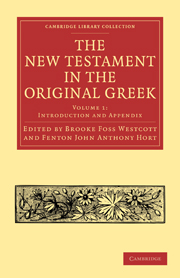I - THE NEED OF CRITICISM FOR THE TEXT OF THE NEW TESTAMENT
Published online by Cambridge University Press: 29 August 2010
Summary
5. The answer to the question why criticism is still necessary for the text of the New Testament is contained in the history of its transmission, first by writing and then by printing, to the present time. For our purpose it will be enough to recapitulate first in general terms the elementary phenomena of transmission by writing generally; with some of the special conditions affecting the New Testament, and then the chief incidents in the history of the New Testament as a printed book which have determined the form in which it appears in existing editions. For fuller particulars, on this and other subjects not needing to be treated at any length here, we must refer the reader once for all to books that are professedly storehouses of information.
Transmission by writing
6. No autograph of any book of the New Testament is known or believed to be still in existence. The originals must have been early lost, for they are mentioned by no ecclesiastical writer, although there were many motives for appealing to them, had they been forthcoming, in the second and third centuries: one or two passages have sometimes been supposed to refer to them, but certainly by a misinterpretation. The books of the New Testament have had to share the fate of other ancient writings in being copied again and again during more than fourteen centuries down to the invention of printing and its application to Greek literature.
- Type
- Chapter
- Information
- The New Testament in the Original Greek , pp. 4 - 18Publisher: Cambridge University PressPrint publication year: 2010First published in: 1881



